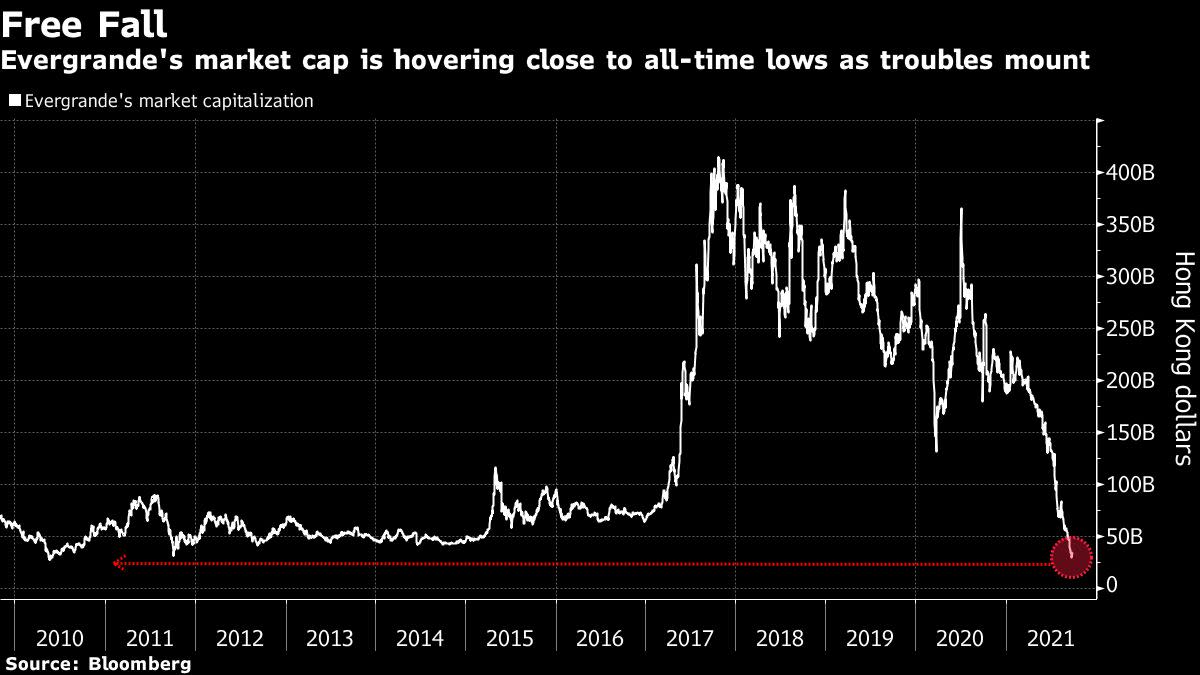China Funds Counting On Beijing to Contain Evergrande Contagion

(Bloomberg) — The closer investors are to Beijing, the less they fear that China Evergrande Group’s debt crisis will cascade into a wider financial meltdown.
Most Read from Bloomberg
That’s the lesson from China’s equity markets this week, which held firm in the face of concern about whether the world’s second-biggest economy was headed for a “Lehman moment.” That’s reinforced by Chinese firms continuing to sell dollar bonds and the yuan riding through this month little changed.
“There’s never been a precedent of letting a mega corporation go bankrupt” in China, said Niu Chunbao, a fund manager at Shanghai Wanji Asset Management Co. The government will not let the situation spiral out of control, he added.
That kind of confidence was conspicuously absent on Monday, with mainland China closed for a two-day holiday and equity markets from Hong Kong to New York swooning amid concern that Evergrande would default on its debts.
When Chinese traders logged back on Wednesday, they pushed the benchmark CSI 300 Index down a touch before returning to buy-mode for most of the next two days. It ended the week 0.1% lower while a measure of Shanghai-listed real-estate stocks rose more than 3% over the period.
That’s not to say that Chinese investors don’t see significant fallout coming from Evergrande, just that they expect it to be largely contained to companies with close links to the developer. That includes banks that extended credit, investors in its bonds, suppliers that depend on its projects and some of Evergrande’s peers.
Regulatory Playbook
“There is an existing rescue system in place and examples to draw from,” Zhongtai Securities Co. analysts including Dai Zhikang wrote in a note this week, citing restructurings like conglomerate HNA Group Co.
If they are right, investors can expect a drawn-out process in which regulators start by nudging the company to save itself through asset disposals and negotiations with creditors and stakeholders.
Only after that, would the government help with liquidity and market stabilization measures. And much later would come strategic investors, likely state-backed, to deal with what’s left.
The restructuring of HNA, which started missing debt payments in 2018, is still going on. Regulators appear to be in the very early stages of any such process with Evergrande.
Financial watchdogs encouraged Evergrande to take all measures to avoid a near-term default on dollar bonds, Bloomberg reported this week. The housing regulator has stepped up oversight of Evergrande’s bank accounts to ensure funds are used to complete housing projects and not diverted to pay creditors, people familiar with the matter said.
Its onshore property unit said Wednesday that it had negotiated a resolution of an interest payment on a yuan bond. The market is still awaiting more details on an $83.5 million interest payment that was due on a dollar note Thursday. It carries a 30-day grace period before any default is called.
“The first signs of a spillover and authorities will expedite restructuring, nipping contagion in the bud to protecting savers and home buyers,” said Jiang Liangqing, managing director at Zhuhai Greenbamboo Private Fund Management Co.
Jian Shi Cortesi, investment director for China and Asia growth equities at GAM Investments in Zurich, echoed the views of her peers in China and suggested that global investors may be prone to see events through the prism of the collapse of Lehman Brothers Holdings Inc.
“Having lived through the chaos in 2008, foreign investors, in my view, are very sensitive when they read about ‘real estate,’ ‘debt’ and ‘default,’” she said. “Domestic investors are not very concerned about Evergrande triggering systematic risks, as they have much higher confidence in the government’s ability to coordinate an orderly debt restructuring.”
Most Read from Bloomberg Businessweek
©2021 Bloomberg L.P.




